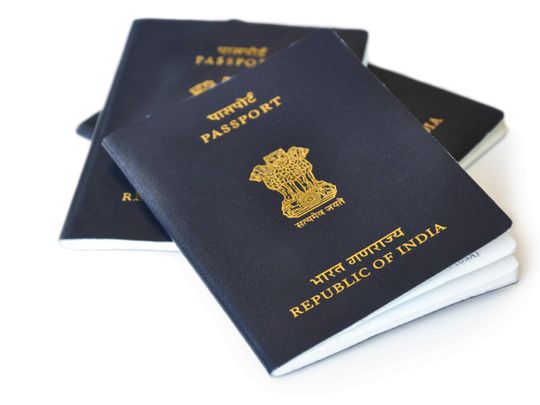-
Over 28,117 residents of Punjab relinquished their citizenship during this period, with Delhi topping the list at 60,414 passports surrendered
-
The motivations behind this trend, according to the Ministry, primarily stem from personal reasons
Punjab, renowned for its historical ties with migration, is currently witnessing a complex interplay of reverse migration and emigration trends. While a surge in affluent Non-Resident Indian (NRI) Punjabis investing in the region suggests a potential reversal of migration, the younger generation of Punjabis is increasingly relocating abroad for education and better opportunities, often accompanied by their elderly parents, as reported by indiatoday.in.
Official data reveals a notable number of Punjabis renouncing their Indian citizenship between 2014 and 2022. The Ministry of External Affairs disclosed in Rajya Sabha that over 28,117 residents of Punjab relinquished their citizenship during this period, with Delhi topping the list at 60,414 passports surrendered. The motivations behind this trend, according to the Ministry, primarily stem from personal reasons.
A closer examination conducted by India Today TV uncovered that, although not widespread, several senior citizens across Punjab are liquidating their assets to settle abroad. The reluctance of their children, now citizens of foreign countries, to return is a driving factor in this decision.
Contrary to the political rhetoric of transforming Punjab into locales such as Ontario, London, or California, where a significant Punjabi diaspora resides, the on-the-ground reality appears starkly different.
Security concerns extend beyond personal safety to property issues, with disputes, land grabs, and fraudulent sales of NRI properties becoming prevalent. Instances like the alleged illegal occupation of a house in Jagraon raised questions about the safety of property ownership for NRIs
Punjab grapples with substantial economic challenges, ranking among the most heavily indebted states in India. With a per capita debt of Rs 1 lakh and a debt-to-GDP ratio soaring to 53.3%, well beyond the agreed-upon ceiling of 20%, the state faces an uphill fiscal battle.
The primary catalyst for the elderly Punjabis seeking a new life abroad and parting with their properties is the escalating unemployment rate in the state, reaching 8.6%. Parents are compelled to sell their assets to finance their children’s education and employment opportunities overseas. However, as the younger generation exhibits reluctance to return, the elderly find themselves compelled to join their children abroad, further divesting their remaining properties, including homes and land.
Kulwant Singh, a 65-year-old US citizen hailing from Pathankot, highlighted that when students attain permanent residency (PR), they often bring their parents with them, and the inclination to return to Punjab is minimal. This sentiment is echoed by other Punjabi expatriates who cite concerns over rising drug problems and crime rates as significant deterrents.
Despite official claims of a decline in crime rates by the Punjab government, NRIs express skepticism, citing prevalent violent incidents, looting, and snatching. The deteriorating law and order situation, coupled with property-related insecurities, have become compelling reasons for many Punjabis to seek a safer and more stable life abroad.
Security concerns extend beyond personal safety to property issues, with disputes, land grabs, and fraudulent sales of NRI properties becoming prevalent. Instances like the alleged illegal occupation of a house in Jagraon raised questions about the safety of property ownership for NRIs.
Satnam Singh Chahal, Executive Director of the North American Punjabi Association (NAPA), emphasized the shift from NRIs advising family members to safeguard their properties in Punjab to now urging them to find buyers due to the prevailing lawlessness. Chahal described the state as experiencing a “complete jungle raj,” highlighting the urgent need for improved security.
In response to this trend, AAP’s chief spokesperson, Malwinder Singh Kang, acknowledged past exploitation of NRIs by politicians and corrupt officials. Kang expressed the current government’s commitment to reversing the trend, emphasizing efforts to address NRI grievances and staunchly supporting reverse migration. Despite these assurances, the exodus of Punjabis, particularly the elderly, seeking security and stability abroad continues to challenge the narrative of a transformed Punjab.
************************************************************************
Readers
These are extraordinary times. All of us have to rely on high-impact, trustworthy journalism. And this is especially true of the Indian Diaspora. Members of the Indian community overseas cannot be fed with inaccurate news.
Pravasi Samwad is a venture that has no shareholders. It is the result of an impassioned initiative of a handful of Indian journalists spread around the world. We have taken the small step forward with the pledge to provide news with accuracy, free from political and commercial influence. Our aim is to keep you, our readers, informed about developments at ‘home’ and across the world that affect you.
Please help us to keep our journalism independent and free.
In these difficult times, to run a news website requires finances. While every contribution, big or small, will makes a difference, we request our readers to put us in touch with advertisers worldwide. It will be a great help.
For more information: pravasisamwad00@gmail.com



